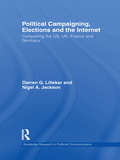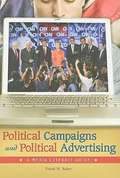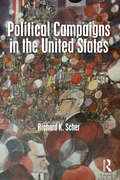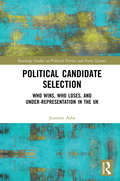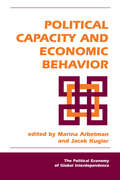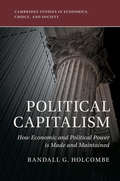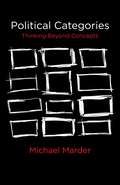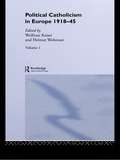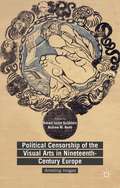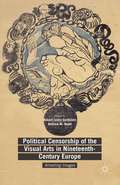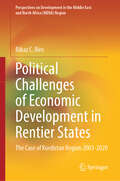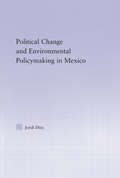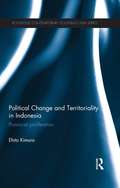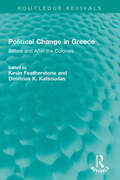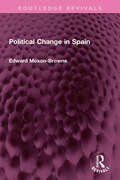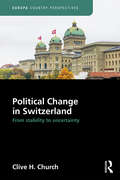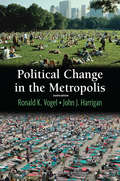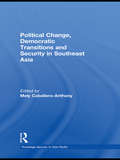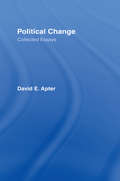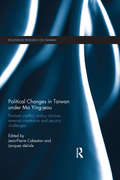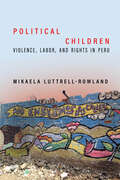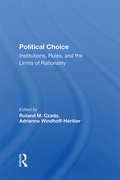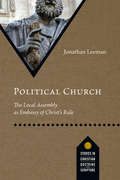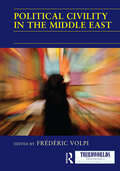- Table View
- List View
Political Campaigning, Elections and the Internet: Comparing the US, UK, France and Germany (Routledge Research in Political Communication)
by Nigel Jackson Darren LillekerThe Internet first played a minor role in the 1992 U.S. Presidential election, and has gradually increased in importance so that it is central to election campaign strategy. However, election campaigners have, until very recently, focused on Web 1.0: websites and email. Political Campaigning, Elections and the Internet contextualises the US Presidential campaign of 2008 within three other contests: France 2007; Germany 2009; and the UK 2010. In offering a comparative history of the use of the Internet as an election tool, the authors are able to test the optimistic view that the Internet is transforming elections while also mapping the role the Internet plays and performs for parties and candidates. Lilleker and Jackson offer in-depth analysis demonstrating how interactive Web 2.0 online tools, including weblogs, social networking sites and file-sharing sites, are utilised and evaluate the role of these tools in the marketing and branding of parties and candidates. Examining the interactivity between candidate, party, and voter, this important book will be of strong interest to students and scholars of political science, elections, international relations and political communication. It will be of value to those within public relations, marketing and related communication and media programmes.
Political Campaigns and Political Advertising: A Media Literacy Guide
by Frank W. BakerBaker, a media literacy consultant and author, has written this media literacy guide for general readers who want more critical insight into propaganda and spin, political advertising and the role of new media technologies in election campaigns. The author uses clear and easy-to-understand language to examine and interpret the content of media messages in print, image and multimedia forms in an objective manner. The author supplies both a timeline of the history of media in politics from 1913 to the present and a glossary of political and media terms. Annotation ©2009 Book News, Inc., Portland, OR (booknews.com)
Political Campaigns in the United States
by Richard K. ScherA Choice Highly Recommended Title—January 2017 This book is an interpretive analysis of political campaigns in America: instead of focusing on how campaigns are designed and run, it investigates the role campaigns play in our American politics, and the close symbiosis between campaigns and those politics. The text examines how campaigns are an important manifestation of how we "do" politics in this country. Hallmarks of this text include: showing how campaigns can undermine our democracy and asking how democratic they—and by extension, our politics--really are; demonstrating that the ability of the media to accurately, fairly, and deeply report on campaigns has been severely compromised, both because of the growing "distance" between campaigns and media outlets and because of the structure of "Big Media" corporate ownership and its tight relationship to "Big Money." It asks important questions about the media including: How do the media, reporters in particular, cover campaigns? What pressures and forces shape what and how they present campaigns? What is the impact of the ever-increasing chasm separating campaigns and the media? How does the close tie between corporate mainstream media and Super PAC money affect campaign coverage? How does the ability of campaigns and media to segment voters into ever-smaller slices influence how campaigns are covered? tracking the continuing growth of unregulated, private, unaccountable "dark money" in campaigns as a threat to our democratic elections and politics. Democracy rests fundamentally on transparency and accountability – sunlight – and our campaign laws and norms now allow and encourage exactly the opposite, largely because of decisions by the United States Supreme Court.
Political Candidate Selection: Who Wins, Who Loses, and Under-Representation in the UK (Routledge Studies on Political Parties and Party Systems)
by Jeanette AsheThe "secret garden of politics", where some win and others lose their candidate selection bids, and why some aspirant candidates are successful while others fail have been enduring puzzles within political science. This book solves this puzzle by proposing and applying a universally applicable multistage approach to discover the relationship between selection rules, selectors’ biases, aspirants’ attributes, and selection outcomes. Rare party and survey data on winning and losing candidates and insider views on what it takes to win a selection contest at multiple selection stages are compared and used to reveal the inner workings of the secret garden. With a primary focus on the British Labour party over several elections, the findings challenge many long-held assumptions about why some aspirant candidate types are successful over others and provides real-world and controversial solutions to addressing women’s and other marginalised groups’ descriptive underrepresentation. As such, it provides a much-needed fresh look at party selection processes and draws new conclusions as to why political underrepresentation occurs and should inform policies to remedy it. This text will be of key interest to scholars and students of gender and ethnicity in politics, political parties and candidate selection, and more broadly to the study of political elites, comparative politics, sociology, labour studies, gender, race, and disability studies, and to practitioners.
Political Capacity and Economic Behavior (The Political Economy of Global Interdependence)
by Jacek Kugler<p>Given today's heightened competition between national economies in the global marketplace, many have come to believe that government intervention is needed in order for a country to maximize its economic well-being. But to what extent can even the most capable government act to attract investment and enhance economic growth without creating or exacerbating conflicts in society—especially when unpopular measures, such as those aimed at controlling inflation and population growth, must be implemented? <p>This timely book by an international team of economists and political scientists tackles that question head on. The contributors draw on theory and empirical data to provide a framework for measuring governments' ability to gather material resources and mobilize populations. They analyze a variety of policy choices made in the United States and in other nations around the world during the past fifty years, showing how states can increase their political capacity and thereby reduce economic transaction costs and domestic resistance to government goals.
Political Capitalism: How Political Influence Is Made and Maintained (Cambridge Studies in Economics, Choice, and Society)
by Randall G. HolcombeProblems associated with cronyism, corporatism, and policies that favor the elite over the masses have received increasing attention in recent years. Political Capitalism explains that what people often view as the result of corruption and unethical behavior are symptoms of a distinct system of political economy. The symptoms of political capitalism are often viewed as the result of government intervention in a market economy, or as attributes of a capitalist economy itself. Randall G. Holcombe combines well-established theories in economics and the social sciences to show that political capitalism is not a mixed economy, or government intervention in a market economy, or some intermediate step between capitalism and socialism. After developing the economic theory of political capitalism, Holcombe goes on to explain how changes in political ideology have facilitated the growth of political capitalism, and what can be done to redirect public policy back toward the public interest.
Political Categories: Thinking Beyond Concepts
by Michael MarderWestern philosophy has been dominated by the concept or the idea—the belief that there is one sovereign notion or singular principle that can make reality explicable and bring all that exists under its sway. In modern politics, this role is played by ideology. Left, right, or center, political schools of thought share a metaphysics of simplification. We internalize a dominant, largely unnoticeable framework, oblivious to complex, plural, and occasionally conflicting or mutually contradictory explanations for what is the case.In this groundbreaking work, Michael Marder proposes a new methodology for political science and philosophy, one which he terms “categorial thinking.” In contrast to the concept, no category alone can exhaust the meaning of anything: categories are so many folds, complications, respectful of multiplicity. Ranging from classical Aristotelian and Kantian philosophies to phenomenology and contemporary politics, Marder's book offers readers a theoretical toolbox for the interpretation of political phenomena, processes, institutions, and ideas. His categorial apparatus encompasses political temporality and spatiality; the revolutionary and conservative modalities of political actuality, possibility, and necessity; quantitative and qualitative approaches to the study of political reality; the meaning of political relations; and various senses of political being. Under this lens, the political appears not as a singular concept but as a family of categories, allowing room for new, plural, and often antagonistic ideas about the state, the people, sovereignty, and power.
Political Catholicism in Europe 1918-1945: Volume 1
by Wolfram Kaiser Helmut WohnoutThis book examines the role of Catholic parties in inter-war Europe in a systematically pan-European comparative perspective. Specific country chapters address key questions about the parties' membership and social organization; their economic and social policies; and their European and international policies at a time of increasing national and ethnic conflict, and the book includes two survey chapters explaining the origins of political catholicism in 19th century Europe and comparing the parties' interwar development, and two chapters ontransnational party contacts.Along with its companion volume, Christian Democracy in Europe Since 1945, also published in 2004, students will have an abundandce of information to guide them through their studies on this fascinating subject.
Political Censorship of the Visual Arts in Nineteenth-Century Europe: Arresting Images
by Robert Justin Goldstein Andrew M. NeddIn this comprehensive account of censorship of the visual arts in nineteenth-century Europe, when imagery was accessible to the illiterate in ways that print was not, specialists in the history of the major European countries trace the use of censorship by the authorities to implement their fears of the visual arts, from caricature to cinema.
Political Censorship of the Visual Arts in Nineteenth-Century Europe: Arresting Images
by Robert Justin Goldstein Andrew M. NeddIn this comprehensive account of censorship of the visual arts in nineteenth-century Europe, when imagery was accessible to the illiterate in ways that print was not, specialists in the history of the major European countries trace the use of censorship by the authorities to implement their fears of the visual arts, from caricature to cinema.
Political Challenges of Economic Development in Rentier States: The Case of Kurdistan Region 2003-2020 (Perspectives on Development in the Middle East and North Africa (MENA) Region)
by Ribaz C. BiroThis book investigates the relationship between politics and economics in rentier states, with a particular focus on the Kurdistan Region of Iraq from 2003 to 2020. Resource-rich states face low levels of economic growth due to the various factors of corruption, weak performance of institutions, poor levels of accountability and transparency in governance, and absence of rule of law. While most previous studies of the topic focus on either the political or economic concerns, this book focuses on their interaction. The book explores the political hurdles in resource-rich states, examining to what extent this impedes economic growth through panel data from 51 rentier states from 2003 to 2020 with different political systems and different types of natural resource dependency. The insights presented in this book have wider implications for understanding and solving similar hurdles in the Kurdistan Region of Iraq and would be a valuable resource for policymakers, strategists, academics, lawmakers, and government officials in implementing sustainable development plans and reducing the negative impacts of natural resource over-reliance in rentier states.
Political Change and Environmental Policymaking in Mexico
by Jordi DiezThis book explores environmental policymaking in Mexico as a vehicle to understanding the broader changes in the policy process within a system undergoing a democratic transformation. It constitutes the first major analysis of environmental policymaking in Mexico at the national level, and examines the implementation of forestry policy in Mexico's largest rain forest, the Selva Lacandona of the state of Chiapas.
Political Change and Territoriality in Indonesia: Provincial Proliferation (Routledge Contemporary Southeast Asia Series)
by Ehito KimuraWhat makes large, multi-ethnic states hang together? At a time when ethnic and religious conflict has gained global prominence, the territorial organization of states is a critical area of study. Exploring how multi-ethnic and geographically dispersed states grapple with questions of territorial administration and change, this book argues that territorial change is a result of ongoing negotiations between states and societies where mutual and overlapping interests can often emerge. It focuses on the changing dynamics of central-local relations in Indonesia. Since the fall of Suharto’s New Order government, new provinces have been sprouting up throughout the Indonesian archipelago. After decades of stability, this sudden change in Indonesia’s territorial structure is puzzling. The author analyses this "provincial proliferation", which is driven by multilevel alliances across different territorial administrative levels, or territorial coalitions. He demonstrates that national level institutional changes including decentralization and democratization explain the timing of the phenomenon. Variations also occur based on historical, cultural, and political contexts at the regional level. The concept of territorial coalitions challenges the dichotomy between centre and periphery that is common in other studies of central-local relations. This book will be of interest to scholars in the fields of comparative politics, political geography, history and Asian and Southeast Asian politics.
Political Change in Greece: Before and After the Colonels (Routledge Revivals)
by Kevin FeatherstonePolitical Change in Greece (1987) surveys the state of politics in Greece as it joined the EEC, experienced a socialist government, and faced changes in its relations within NATO. It provides historical background explaining the changes in regimes since the Second World War, and looks at different elements in Greek politics – processes, parties, interest groups and key policy areas – outlining for each recent development the likely future state of affairs.
Political Change in Southeast Asia
by Jacques BertrandSoutheast Asia is a vast and complex region, comprising countries with remarkably diverse histories and cultures. Jacques Bertrand provides a fresh and highly original survey of politics and political change in this area of the world. Against the backdrop of rapid economic development and social transformation in several countries, he explores why some countries have adopted democratic institutions, while others have maintained stable authoritarian systems or accepted communist regimes. Bertrand presents a historically grounded account of capitalist countries and state-socialist countries, delving into the historical experience of individual countries, whilst simultaneously providing a comparative framework with which to draw parallels and foster a better understanding of the political and economic dynamics both within and between the countries. With powerful yet accessible analysis and detailed coverage, this book offers students and scholars a thorough and thought-provoking introduction to the political landscape of Southeast Asia.
Political Change in Spain (Routledge Revivals)
by Edward Moxon-BrowneFirst published in 1989, Political Change in Spain provides a stimulating and innovative account of Spain’s maturing democracy since 1982. Challenging the accepted wisdom that Spanish democracy is a fragile plant, the author demonstrates its strong roots and healthy growth in the context of the European Community. He argues that, despite the problems of economic transformation, Spain’s political attachments to Western Europe suggest that the Spanish economy will benefit in the long run from its increasing integration with its neighbours. The book also analyses the continuing threat to stability posed by separatist aspirations in the Basque country, in the context of the experiments with autonomous regional governments. This book will be valuable to anyone looking for a succinct introduction to changes in Spain, as well as to students of Western European politics, women’s studies and the Spanish language.
Political Change in Switzerland: From Stability to Uncertainty (Europa Country Perspectives)
by Clive H. ChurchPolitical Change in Switzerland explains the striking recent political developments in Switzerland, an important but surprisingly little known and often misunderstood country, aiming to dissipate prevailing myths about Switzerland in its European context. Firstly, the title provides an analysis of the way the practice and processes of Swiss politics have so dramatically changed over the last 25 years, setting out the differences between outside perceptions and changing Swiss realities. Secondly, it discusses how far the country has moved, from the stability of the post-war period to a new era of uncertainty, in which the so called Sonderfall, or special case, no longer seems to apply. In doing so it analyses the populist movement, centred on the Swiss People’s Party, examining its support and tactical operations, as well as the response of the establishment to the challenges the movement poses, both generally and where key questions of policy on foreigners and the EU are concerned. Finally, the title explains how much of this change is related to Europe, and discusses the prospects for Switzerland, Europe and the EU member states in the light of this new Swiss uncertainty. The way in which globalization has imposed new stresses on Switzerland, both in external policy and social terms, is the key theme of the title. These stresses have, in turn, encouraged the growth of a new populist movement, drawing on social classes previously supportive of other forces, and employing aggressive new tactics, creating a challenge that the establishment has found it hard to counter, so that stability has been compromised. As a result, Switzerland now faces two linked policy challenges, to find ways of accommodating unease about immigration and to devise a realistic and widely acceptable new relationship with the EU. The book’s underlying belief is that these changes have left the country divided and uncertain about its future. This title offers in-depth analysis of Switzerland's domestic and European politics and policies. It is also innovative in trying both to bring out the European roots of recent political changes in Switzerland and of the challenges these pose to the Swiss status quo and for the evolution of the EU and member states such as the United Kingdom. This is a book for those interested in Switzerland, academics, business people, diplomats, journalists and political commentators.
Political Change in the Metropolis
by Ronald Vogel John HarriganThis popular text has been thoroughly updated and revised to sharpen the focus on its 'bias and change' theme, include the latest data/studies informing the field, and cover important new topics (e.g., flood disaster in New Orleans). Political Change in the Metropolis, Eighth Edition, continues to focus on the political changes that have taken place in American cities and the reactions of urban scholars to them. In addition to offering scholarly perspectives, the text offers students a theoretical framework for interpreting these changing events for themselves. This framework analyzes the patterns of bias inherent in the organization and operation of urban politics, giving students an in-depth look at the fascinating and constantly changing face of urban politics. Features Accessible writing style engages students in the material. Provides excellent coverage of the impact of immigrants and ethnic groups in the making of the American city. An abundance of historical material helps students better understand the origins and development of urban politics and structures. Case studies throughout the text give students an opportunity to apply important material. The text exposes students to first-rate discussions of political phenomena and empirical literature on those phenomena.
Political Change, Democratic Transitions and Security in Southeast Asia (Routledge Security in Asia Pacific Series)
by Mely Caballero-AnthonyThe fragility of democracy in Southeast Asia is a subject of increasing concern. While there has been significant movement in the direction of democratisation, the authoritarian tendencies of popularly elected leaders and the challenges posed by emerging security threats have given rise to a shared concern about the return of military rule in the region. This book examines the nature of political transitions in Southeast Asia and why political transitions towards political liberalisation and democracy have often failed to take off. It considers political systems in Southeast Asia that have gone through significant periods of transition but continue to face serious challenges toward democratic consolidation. Some key questions that the book focuses on are – Are emerging democracies in the region threatened by weak, failed or authoritarian leadership? Are political institutions that are supposed to support political changes toward democratisation weak or strong? How can democratic systems be made more resilient? and What are the prospects of democracy becoming the defining political landscape in Southeast Asia?
Political Change: A Collection of Essays
by David E. ApterPublished in the year 1973, Political Change is a valuable contribution to the field of Politics.
Political Changes in Taiwan Under Ma Ying-jeou: Partisan Conflict, Policy Choices, External Constraints and Security Challenges (Routledge Research on Taiwan Series)
by Jacques DeLisle Jean-Pierre CabestanIn 2008 Ma Ying-jeou was elected President of Taiwan, and the Kuomintang (KMT) returned to power after eight years of rule by the Democratic Progressive Party (DPP). Since taking power, the KMT has faced serious difficulties, as economic growth has been sluggish, society has been polarised over issues of identity and policy, and rapprochement between Taipei and Beijing has met with suspicion or reservation among large segments of Taiwanese society. Indeed, while improved relations with the United States have bolstered Taiwan’s security, warming cross-Strait relations have in turn made Taiwan more dependent upon and vulnerable to an increasingly powerful China. This book provides a comprehensive analysis of the return of the Kuomintang (KMT) to power, and examines the significant domestic political, economic, social and international challenges and changes that have characterized Taiwan since 2008. It identifies the major domestic, cross-Strait and foreign policy trends, and addresses key issues such as elections and Taiwan’s party system; the role of the presidency and legislature; economic development; social movements; identity politics; developments in cross-Strait relations; Taiwan’s security environment and national defence policies; relations with the US and Japan. In turn, the contributors look towards the final years of Ma’s presidency and beyond, and the structural realities – both domestic and external – that will shape Taiwan’s future. Political Changes in Taiwan Under Ma Ying-jeou will be of great interest to students and scholars of Taiwan studies, comparative politics, international relations, and economics. It will also appeal to policy makers working in the field.
Political Children: Violence, Labor, and Rights in Peru
by Mikaela Luttrell-RowlandGrounded in extensive interviews, longitudinal methods, historical analysis, and archival work, Mikaela Luttrell-Rowland shows how two distinct groups of working young people in Lima, Peru have become political protagonists, resisting and critiquing the daily inequality and injustice they face. She details the ways these young people interpret and address a range of issues affecting their lives—from environmental degradation to second-rate public facilities, gender-based violence to dangerous working conditions—and reveals a range of ways they make sense of their systematic marginalization and their own labor, and in doing so, how they navigate everyday state violence. By attending to the affect, longing, and desires that animate these young people's politics, Luttrell-Rowland conveys the meaning of their lives and work in an economy that invokes their subjectivity and rights while rendering them non-participatory subjects. Though the lives of young people are often imagined as far from politics, these "political children" expose the contradictions of public policy narratives in which the Peruvian state is cast as a neutral site for engagement and action. Through their criticism and activism, the young people in this book demonstrate that such narratives divorce state power from the very places in which it is experienced as structural violence.
Political Choice: Institutions, Rules And The Limits Of Rationality
by Roland M Czada Adrienne Windhoff-HeritierThis book, subtitled "political actors in institutional settings", addresses the main lines of reasoning of the new political institutionalism and rational choice theory. It discusses the question: Which particular rules, logics, or strategies of action can be found in the realm of politics?
Political Church: The Local Assembly as Embassy of Christ's Rule (Studies in Christian Doctrine and Scripture)
by Jonathan LeemanThe church is political. Theologians have been debating this claim for years. Liberationists, Anabaptists, Augustinians, neo-Calvinists, Radical Orthodox and others continue to discuss the matter. What do we mean by politics and the political? What are the limits of the church's political reach? What is the nature of the church as an institution? How do we establish these claims theologically? Jonathan Leeman sets out to address these questions in this significant work. Drawing on covenant theology and the "new institutionalism" in political science, Leeman critiques political liberalism and explores how the biblical canon informs an account of the local church as an embassy of Christ's kingdom. Political Church heralds a new era in political theology.
Political Civility in the Middle East (ISSN)
by Frédéric VolpiContemporary debates about civility are shaped by the dominant liberal and secular narratives of a peaceful world of sovereign nation-states. For contemporary scholars and policy makers, the challenge is to insert meaningfully the political evolution of the Middle East in the dominant liberal-democratic discourse about the current international order without invoking ill-conceived notions of Islamic exceptionalism.The analyses gathered in this book challenge conventional ‘western’ perspectives on civility as an expression of state-guaranteed free association in a non-violent space of discourse and behaviour. Considering the articulation of ‘civil’ and ‘civilized’ state-society relations in contemporary Middle Eastern polities, this book proposes both conceptual and empirical insights into the dynamics of the local, national and trans-national formation of civility and of the civil sphere. Bypassing traditional oppositions between the ‘western’ and ‘Islamic’ modernity, it provides an account of the communicative clusters of civility that represent the everyday formations of Islamic and secular subjects in settings organized by authoritarian-inclined state institutions and practices. It examines how the grassroots formation of ‘new’ religious and secular identities/subjectivities and their relations with the ‘Other’ underpin, as well as challenge and transform, the state-led processes of political ordering of a national and regional community.This book was originally published as a special issue of Third World Quarterly.
